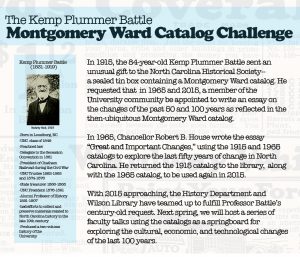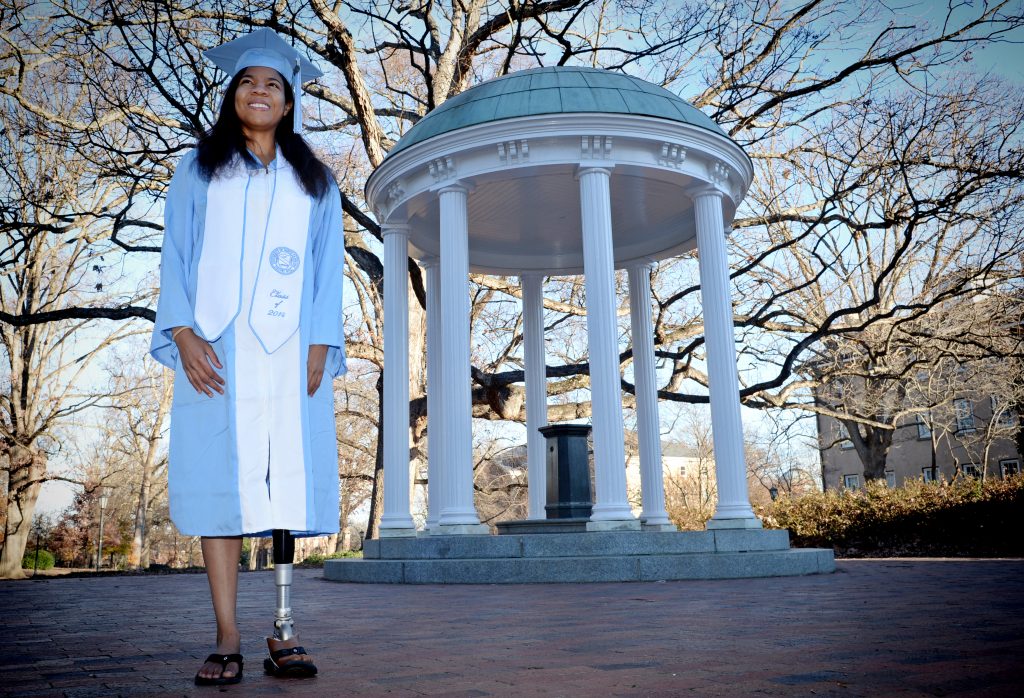
In 1915, 84-year-old former UNC President Kemp Plummer Battle sent an unusual gift to the North Carolina Historical Society — a “hermetically sealed tin box” containing a letter and a Montgomery Ward catalog from that year.
He requested that in 1965, and again in 2015, that a member of the University community write an essay reflecting on the changes of the past 50 and 100 years — using the catalogs as a springboard for discussion. The essay writer would receive $50.
“That the changes will be great and important … may be gathered from the fact that the railroad system, telegraph, telephones, the machines worked by electricity, aircraft, submarines and hundreds of other inventions have been made practical since I was born …” Battle wrote.
In 1965, Chancellor Robert B. House wrote the essay, “Great and Important Changes,” then returned the catalogs to the UNC Library. House observed that the 1915 catalog devoted only four pages to the automobile, but displayed “the horse in all his glory in over fifty pages.” The 1965 catalog reversed the picture, devoting 85 pages to the automobile.

The history department in the College of Arts and Sciences and the UNC Library are teaming up to fulfill the century-old request. They will continue “The Kemp Plummer Battle Montgomery Ward Catalog Challenge” with a modern-day twist.
A series of faculty talks this spring and fall will explore the cultural, economic and technological changes of the last 100 years.
The first event, on April 8, “Mail Order Catalogs and Consumers,” will be at 5:30 p.m. in the Pleasants Family Assembly Room in Wilson Library. It will be moderated by Fitz Brundage, chair and professor of history, with presentations by John Kasson, UNC professor of history and American studies, and Dana McMahan, UNC professor of journalism and mass communication.
Displays at the April event will include Battle’s original letter, the 1915 and 1965 catalogs (now also digitized via the Southern Historical Collection) and a copy of House’s essay.

A September event, “Mail Order Catalogs and the American Economy,” with date to be determined, will be moderated by Brundage and feature Peter Coclanis, UNC professor of history, and Lee Craig, professor in the Poole College of Management at NC State University.
Brundage said Battle was visionary in conceiving the idea in 1915.
“Historians of his era concentrated almost exclusively on political, military and diplomatic history,” Brundage said. “The [examination] of social history, of common-day life, wasn’t really studied by professional historians until the 1920s and ’30s. … It would be like somebody in 1995 saying, ‘Fifty and 100 years from now I want to see a reflection on how Apple has transformed our lives.’”
In 1872, Aaron Montgomery Ward established the first mail-order business with a single-sheet catalog offering 163 items. The company still exists online today.

Brundage calls Montgomery Ward, Sears and other mail order giants “the Amazon of their day.”
What would students be most surprised about regarding changes in the last century?
University historian Cecelia Moore said communication was very different in Battle’s day.
“It’s hard to imagine a world where you may not necessarily have a phone line,” she said. “You didn’t see family very often if you moved far away, so letters might have been the only way you communicated. We take it for granted today that we can call, Skype or e-mail.”
Charlotte Battle Robbins, Kemp Battle’s great-great-granddaughter, is expected to attend the April 8 talk along with her mother, Charlotte Timberlake Battle. Other family members may also attend.
By Kim Spurr, College of Arts and Sciences



